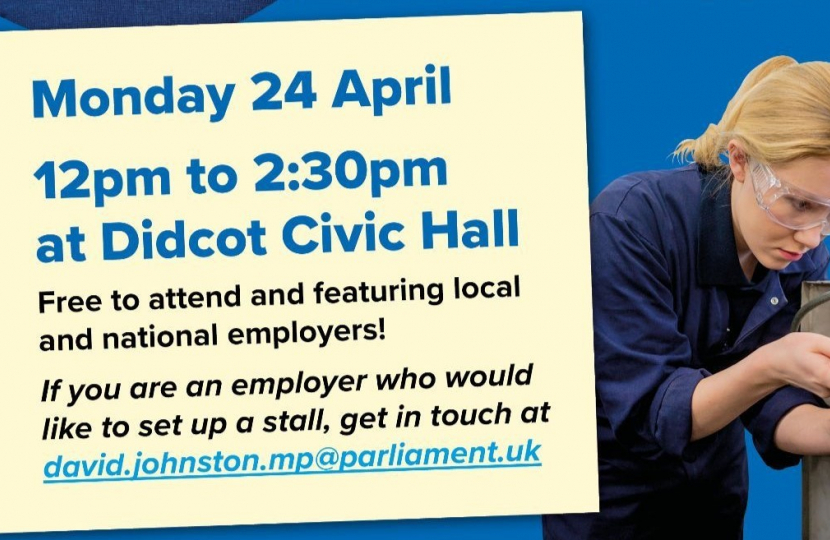
Before I talk about the main subject of this week’s article, please make sure you’ve taken part in my Health Services Survey before it closes on 27th April. It’s 8 short questions about your experience of accessing health services like GP/dentist appointments and it’s a non-political questionnaire designed to give you your say and, in turn, help my campaigning for the health services we need locally. You can complete it here: https://www.david-johnston.org.uk/health
On Monday 24th April I will hold an Apprenticeships Fair, bringing together local employers and local young people at Didcot Civic Hall (other members of the public can attend from 12pm). I visit a school pretty much every week and have numerous conversations with young people who do not know enough about the range of apprenticeships open to them. At the same time, I’ve had various local employers say they can struggle to recruit local people for their apprenticeships, so it made sense to bring the two groups together.
The Government introduced the Apprenticeship Levy – a form of tax on large employers that funds the development of apprenticeships – so that we could see a lot more apprenticeships offered in this country. They’ve been a much larger part of the training young people in other countries get and the idea was to get away from the drive for everyone to go to university, which can be great but isn’t for everyone.
The traditional view of apprenticeships in the UK is they’re for people who want to become engineers or plumbers – both good careers, I should add – but the levy has led to a huge growth in apprenticeships that help you become everything from lawyer to doctor. They’re a great opportunity for people who want to get stuck into work rather than full-time study and they help you avoid the debt you take on when you go to university. And with degree-level apprenticeships, you can still obtain a higher education qualification from many of our leading universities while working.
When I ran charities for disadvantaged young people, it was assumed apprenticeships would automatically improve social mobility as disadvantaged young people would not go to university when fees were increased to £9,000 a year. This is in fact was not the case, as we saw record numbers of disadvantaged young people go to university after the fee increase, while more affluent young people took a disproportionate share of the higher-level apprenticeships.
There are a few reasons for this – including the fact that most parents and teachers are often unfamiliar with apprenticeship routes so don’t recommend them as often as they do university – but I hope my fair next week will help some local young people access opportunities they didn’t know about.
